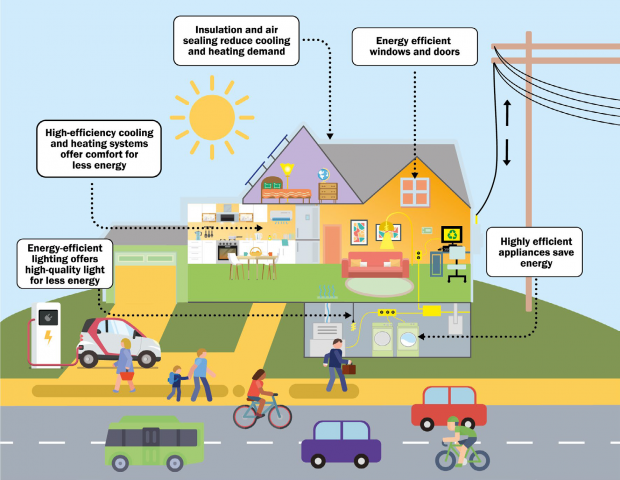Improving energy efficiency
It is about transforming the way we use energy. The more efficient we are with the energy we use, the greater our ability to reduce both the amount of electricity we generate, and our reliance on burning fossil fuels that leads to harmful emissions. If our homes and businesses don’t need as much power and heat to operate, then energy bills are reduced, putting more money in the consumer’s pocket, and helping businesses to improve their competitive advantage.
Improving energy efficiency in our building stock will not only contribute to decarbonising energy but also provide a stimulus to economic growth. Investment in retrofitting buildings will provide a substantial stimulus to jobs in the construction sector, as well as the wider economy.

The illustration shows the following features in a house:
- energy efficient lighting offers high-quality light for less energy
- high efficiency cooling and heating systems offer comfort for less energy
- insulation and air sealing reduce cooling and heating demand
- energy efficient windows and doors
- highly efficient appliances save energy
Department for the Economy responsibilities
The Department for the Economy has lead responsibility for the development of energy efficiency policy and legislation in Northern Ireland, working with other departments and public bodies.
In this regard, the department’s work focuses on the following areas:
- Development and implementation of new policies and programmes aimed at improving the energy performance of domestic and non-domestic buildings, in the context of Pages 37-41 of the new Energy Strategy Energy Strategy for Northern Ireland: The Path to Net Zero Energy
- Co-ordinating policy development with other public bodies whose functions impact on energy efficiency policy;
- Ensuring interested stakeholders have a clear direction of travel linked to government priorities; and
- Ensuring the legislative framework governing energy efficiency continues to operate following UK withdrawal from the EU.
Research into the future policy direction of energy efficiency
In 2020 Ove Arup undertook a comprehensive research study, for the Department, to identify a road map of energy efficiency policy levers to help Northern Ireland contribute to UK ‘net zero’ 2050 targets.
The report is avaliable at: Research into the Future of Energy Efficiency Policy in Northern Ireland
Energy Management Strategy and Action Plan to 2030 (for Northern Ireland Central Government)
The Energy Management Strategy and Action Plan for NI Central Government (EMS), aims to support and significantly accelerate actions to maximise exploitation of energy efficiency opportunities in both current and future assets and work towards improved governance, accountability, strategic management and reporting arrangements for sustained longer-term success.
As part of the 2016/17 Asset Management Strategy Action Plan, Strategic Investment Board (SIB) reviewed energy management opportunities across 3,051 public assets in order to reduce demand and costs, generate revenue and provide this road map for delivery of energy and cost savings.
The EMS has two main objectives:
- Establishing effective energy management processes that unlock value
- Lowering net energy consumption by 30 per cent by 2030 across Government (from a 2016/17 baseline year)
Progress against this 30 per cent target will be assessed annually and will be informed by robust consumption data. The Department for the Economy has agreed to be the sponsor Department for the Energy Management Programme, on behalf of the NICS.
Other public sector stakeholders
Given the cross cutting nature of energy efficiency, the department relies on a number of other Executive departments and public bodies to fulfil its role in improving energy efficiency, including:.
- Department for Communities - responsible for housing policy and fuel poverty strategy
- Department of Finance - responsible for Building Regulations and policy relating to Energy Performance Certificates (EPCs)
- Department for Infrastructure - responsible for sustainable transport planning
- Strategic Investment Board - co-sponsor in delivery of the Energy Management Programme on behalf of NI central government
- Invest NI - promotion of energy efficiency in commerce and industry
- Northern Ireland Authority for Utility Regulation - promotion of energy efficient practices when exercising regulatory duties
- Northern Ireland Housing Executive - improving energy efficiency in housing stock through its role as the Home Energy Conservation Authority for Northern Ireland
- Local councils - Enforcement of building regulations
- Department for Energy Security and Net Zero– responsible for UK Government energy efficiency policy and legislation matters, including the reserved policy area of energy labelling and eco-design
